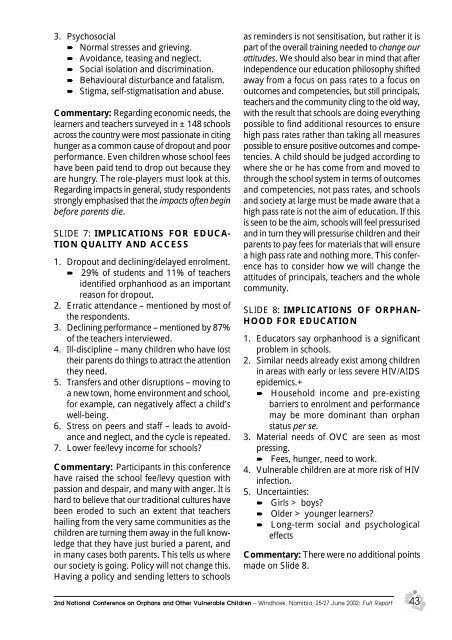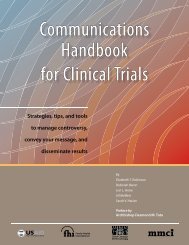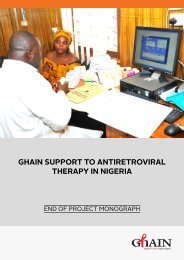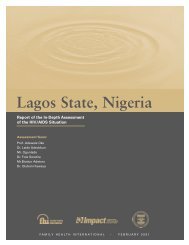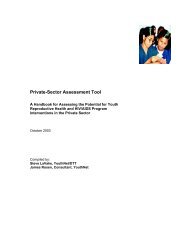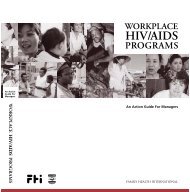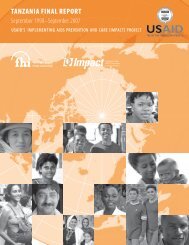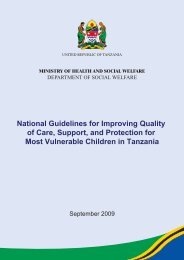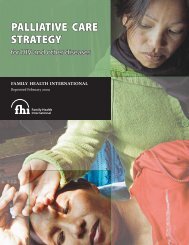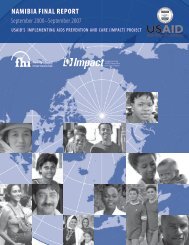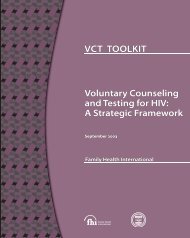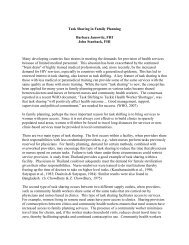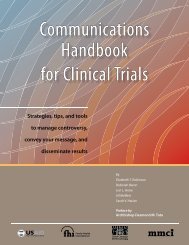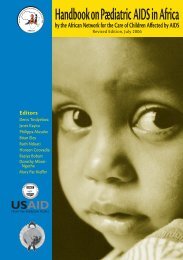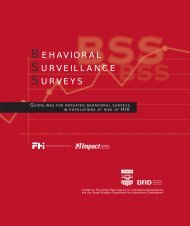2nd National Conference on Orphans and Other ... - FHI 360
2nd National Conference on Orphans and Other ... - FHI 360
2nd National Conference on Orphans and Other ... - FHI 360
You also want an ePaper? Increase the reach of your titles
YUMPU automatically turns print PDFs into web optimized ePapers that Google loves.
3. Psychosocial<br />
Normal stresses <strong>and</strong> grieving.<br />
Avoidance, teasing <strong>and</strong> neglect.<br />
Social isolati<strong>on</strong> <strong>and</strong> discriminati<strong>on</strong>.<br />
Behavioural disturbance <strong>and</strong> fatalism.<br />
Stigma, self-stigmatisati<strong>on</strong> <strong>and</strong> abuse.<br />
Commentary: Regarding ec<strong>on</strong>omic needs, the<br />
learners <strong>and</strong> teachers surveyed in ±148 schools<br />
across the country were most passi<strong>on</strong>ate in citing<br />
hunger as a comm<strong>on</strong> cause of dropout <strong>and</strong> poor<br />
performance. Even children whose school fees<br />
have been paid tend to drop out because they<br />
are hungry. The role-players must look at this.<br />
Regarding impacts in general, study resp<strong>on</strong>dents<br />
str<strong>on</strong>gly emphasised that the impacts often begin<br />
before parents die.<br />
SLIDE 7: IMPLICATIONS FOR EDUCA-<br />
TION QUALITY AND ACCESS<br />
1. Dropout <strong>and</strong> declining/delayed enrolment.<br />
29% of students <strong>and</strong> 11% of teachers<br />
identified orphanhood as an important<br />
reas<strong>on</strong> for dropout.<br />
2. Erratic attendance – menti<strong>on</strong>ed by most of<br />
the resp<strong>on</strong>dents.<br />
3. Declining performance – menti<strong>on</strong>ed by 87%<br />
of the teachers interviewed.<br />
4. Ill-discipline – many children who have lost<br />
their parents do things to attract the attenti<strong>on</strong><br />
they need.<br />
5. Transfers <strong>and</strong> other disrupti<strong>on</strong>s – moving to<br />
a new town, home envir<strong>on</strong>ment <strong>and</strong> school,<br />
for example, can negatively affect a child’s<br />
well-being.<br />
6. Stress <strong>on</strong> peers <strong>and</strong> staff – leads to avoidance<br />
<strong>and</strong> neglect, <strong>and</strong> the cycle is repeated.<br />
7. Lower fee/levy income for schools?<br />
Commentary: Participants in this c<strong>on</strong>ference<br />
have raised the school fee/levy questi<strong>on</strong> with<br />
passi<strong>on</strong> <strong>and</strong> despair, <strong>and</strong> many with anger. It is<br />
hard to believe that our traditi<strong>on</strong>al cultures have<br />
been eroded to such an extent that teachers<br />
hailing from the very same communities as the<br />
children are turning them away in the full knowledge<br />
that they have just buried a parent, <strong>and</strong><br />
in many cases both parents. This tells us where<br />
our society is going. Policy will not change this.<br />
Having a policy <strong>and</strong> sending letters to schools<br />
as reminders is not sensitisati<strong>on</strong>, but rather it is<br />
part of the overall training needed to change our<br />
attitudes. We should also bear in mind that after<br />
independence our educati<strong>on</strong> philosophy shifted<br />
away from a focus <strong>on</strong> pass rates to a focus <strong>on</strong><br />
outcomes <strong>and</strong> competencies, but still principals,<br />
teachers <strong>and</strong> the community cling to the old way,<br />
with the result that schools are doing everything<br />
possible to find additi<strong>on</strong>al resources to ensure<br />
high pass rates rather than taking all measures<br />
possible to ensure positive outcomes <strong>and</strong> competencies.<br />
A child should be judged according to<br />
where she or he has come from <strong>and</strong> moved to<br />
through the school system in terms of outcomes<br />
<strong>and</strong> competencies, not pass rates, <strong>and</strong> schools<br />
<strong>and</strong> society at large must be made aware that a<br />
high pass rate is not the aim of educati<strong>on</strong>. If this<br />
is seen to be the aim, schools will feel pressurised<br />
<strong>and</strong> in turn they will pressurise children <strong>and</strong> their<br />
parents to pay fees for materials that will ensure<br />
a high pass rate <strong>and</strong> nothing more. This c<strong>on</strong>ference<br />
has to c<strong>on</strong>sider how we will change the<br />
attitudes of principals, teachers <strong>and</strong> the whole<br />
community.<br />
SLIDE 8: IMPLICATIONS OF ORPHAN-<br />
HOOD FOR EDUCATION<br />
1. Educators say orphanhood is a significant<br />
problem in schools.<br />
2. Similar needs already exist am<strong>on</strong>g children<br />
in areas with early or less severe HIV/AIDS<br />
epidemics.+<br />
Household income <strong>and</strong> pre-existing<br />
barriers to enrolment <strong>and</strong> performance<br />
may be more dominant than orphan<br />
status per se.<br />
3. Material needs of OVC are seen as most<br />
pressing.<br />
Fees, hunger, need to work.<br />
4. Vulnerable children are at more risk of HIV<br />
infecti<strong>on</strong>.<br />
5. Uncertainties:<br />
Girls > boys?<br />
Older > younger learners?<br />
L<strong>on</strong>g-term social <strong>and</strong> psychological<br />
effects<br />
Commentary: There were no additi<strong>on</strong>al points<br />
made <strong>on</strong> Slide 8.<br />
<str<strong>on</strong>g>2nd</str<strong>on</strong>g> <str<strong>on</strong>g>Nati<strong>on</strong>al</str<strong>on</strong>g> <str<strong>on</strong>g>C<strong>on</strong>ference</str<strong>on</strong>g> <strong>on</strong> <strong>Orphans</strong> <strong>and</strong> <strong>Other</strong> Vulnerable Children – Windhoek, Namibia, 25-27 June 2002: Full Report<br />
43


